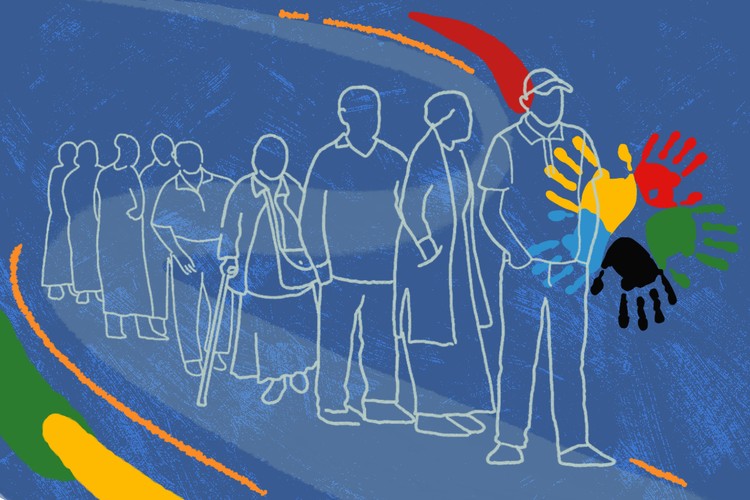SASSA says it has fixed most of its audit problems but gaps remain
About R140‑million was paid to deceased beneficiaries over three years
SASSA has told Parliament it has implemented 98% of the corrective actions the Auditor-General required of it. Illustration: Lisa Nelson
- The South African Social Security Agency (SASSA) has told Parliament it has implemented 98% of the corrective actions the Auditor-General required of it, but there are still gaps in its systems.
- Among other issues, about R140‑million went to deceased beneficiaries over three years.
- SASSA is testing a bulk recall system to recover these payments.
- MPs questioned whether relying on quarterly data from Home Affairs and on citizens to report deaths is enough to prevent future improper payments.
- SASSA said it is digitising manual files and upgrading its Beneficiary Records Management system.
The South African Social Security Agency (SASSA) has told Parliament it has implemented 98% of the corrective actions which the Auditor-General required of it. But there are still gaps in its systems.
On Wednesday, SASSA updated the portfolio committee on social development on its audit action plan. Chief executive officer Themba Matlou said, “We are happy to indicate that out of 177 corrective actions that needed to be implemented, we corrected at least 173.”
There are four outstanding findings stemming from the 2023/24 audit: two IT-related and two grant administration issues.
The most serious case involved 486 beneficiaries being paid disability and old-age grants without files at the Cradock Local Office between 2018 and 2023. A total of R55.6-million was disbursed before the grants were cancelled in January 2024.
Matlou said the case is under investigation by the Hawks. He told MPs, “We admit our systems allowed some of the applications to get through … We’ve already suspended officials who’ve committed fraud. We are working with law enforcement, the Hawks and the Special Investigating Unit on those cases.”
As a preventative measure, he said SASSA has introduced biometrics to its Social Grant Payment System to ensure every official working on applications can be identified.
Another long-running problem flagged by the Auditor-General is grants paid to deceased beneficiaries.
Between the 2021/22 and 2023/24 financial years, SASSA paid about R140-million in grants to 75,000 deceased beneficiaries. The agency blamed this on the late reporting of deaths to the Department of Home Affairs.
SASSA Chief Financial Officer Tsakeriwa Chauke explained that because grant payment instructions are generated days in advance, some beneficiaries die after files have already been processed. This means their accounts are still credited, even though they are no longer entitled to the grant.
To address this, SASSA is developing a “bulk recall” mechanism with Bankserv and the South African Reserve Bank to claw back payments if a death is confirmed after funds have been transferred. The system is in testing and is expected to be comopleted by 30 September 2025.
Chauke added that for deaths reported only after payments were made, the grants would be treated as debts and recovered later.
Incomplete records, outdated systems
The Auditor-General also found that not all beneficiaries who received grants were listed in SASSA’s Beneficiary Records Management system, raising questions about the completeness of its database.
Matlou said the problem arises from pressure at local offices, which prioritise assisting people in the queues over capturing grant applications on the system.
“When people come to the local offices, we must help them … But at the end of the day, there’s back-office work we still need to do, which entails capturing the application on the system,” he said.
SASSA has since launched a digitisation project to deal with incomplete or missing beneficiary records. The project involves scanning all active manual files and uploading them onto the management system, so that grant payments can be properly verified against the payment system.
Matlou said nearly 67% of active files have already been scanned, with the remaining 33% expected to be completed within the year. To speed up the process, SASSA plans to contract temporary staff from October to help with both record-scanning and grant reviews.
The project will also allow officials to capture beneficiary information when people apply, reducing the risk of backlogs and ensuring that records are immediately digitised, Matlou said.
Alexandra Abrahams (DA) pressed the agency on how much of the R55-million lost in the Eastern Cape has been recovered.
ANC MP Kerileng Tlhong asked what escalation mechanisms exist when Home Affairs fails to notify SASSA of deaths on time.
Matlou responded that recoveries in the Eastern Cape case could only be determined once investigations by the Hawks are complete. On relations with Home Affairs, he said SASSA meets quarterly with the department, but stressed that the system depends on citizens reporting deaths of grant beneficiaries.
Support independent journalism
Donate using Payfast

Don't miss out on the latest news
We respect your privacy, and promise we won't spam you.
Next: Fire devastates community owned farm
Previous: Rubbish piles up in KwaMashu as waste workers dispute salary cuts
© 2025 GroundUp. This article is licensed under a Creative Commons Attribution-NoDerivatives 4.0 International License.
You may republish this article, so long as you credit the authors and GroundUp, and do not change the text. Please include a link back to the original article.
We put an invisible pixel in the article so that we can count traffic to republishers. All analytics tools are solely on our servers. We do not give our logs to any third party. Logs are deleted after two weeks. We do not use any IP address identifying information except to count regional traffic. We are solely interested in counting hits, not tracking users. If you republish, please do not delete the invisible pixel.

